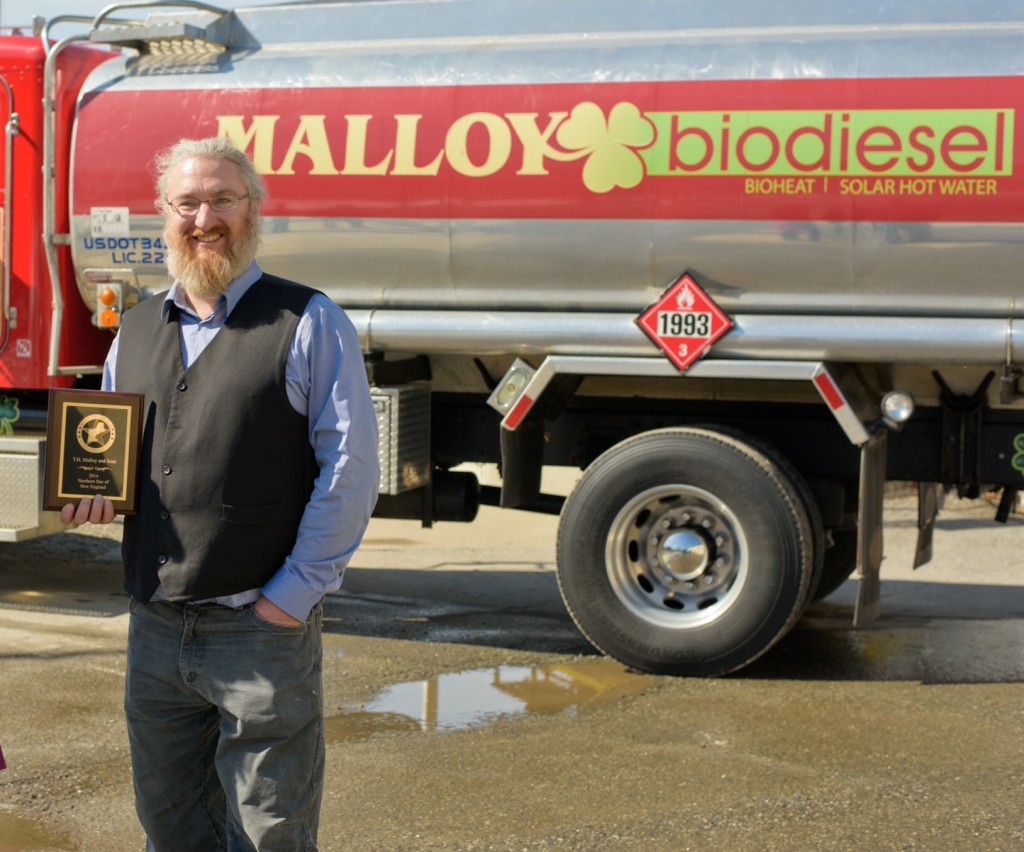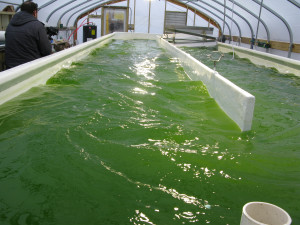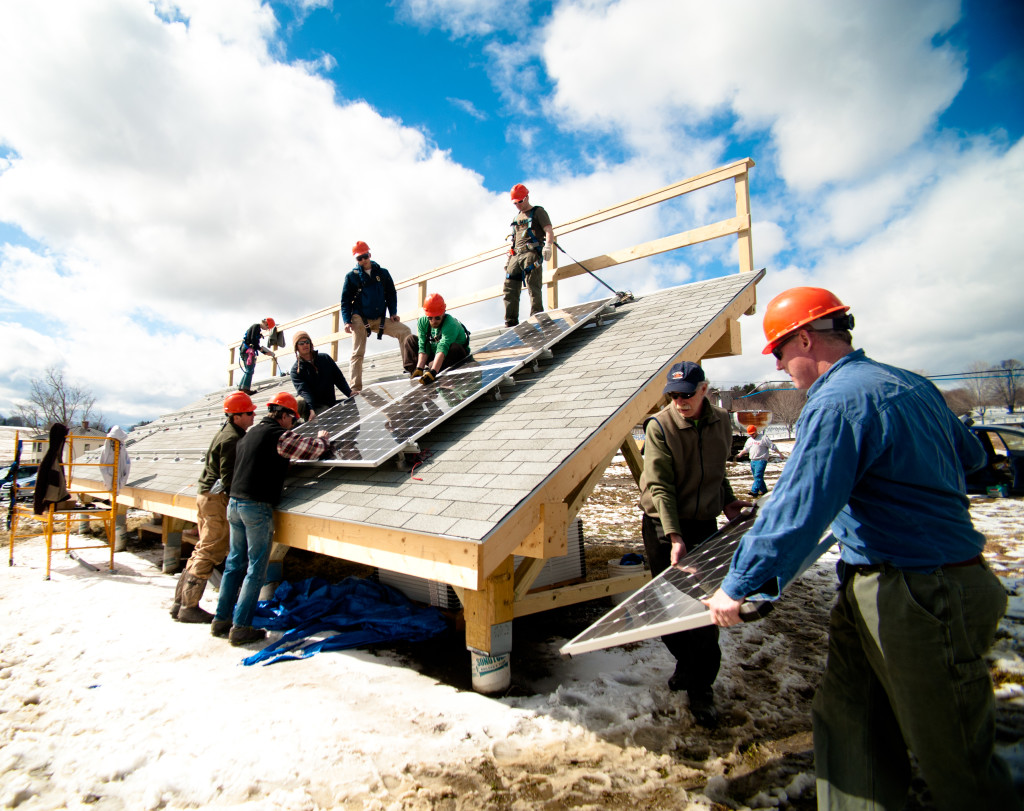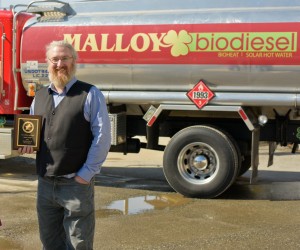
Jim Malloy, of Plainfield, Vermont, is recognized for displacing petroleum with biodiesel in New England’s transportation sector.
Jim Malloy, of Plainfield, Vermont, is being recognized for his contributions to reducing the use of petroleum fuel in the transportation sector. His business, TH Malloy and Sons in Newport, Rhode Island, is being recognized with the New England Northern Star Award as one of the top fleets for reducing their emissions through the use of biodiesel made from recycled restaurant oil.
The 75-year-old family business is a distributor for Newport Biodiesel, also of RI, who produces biodiesel from recycled restaurant oil. Both companies are being recognized with the award.
Each recipient of the award demonstrated a deep commitment to the goals of the Clean Cities program through use of alternative fuels, alternative fuel vehicle purchasing, and petroleum reduction practices. The designation as a Northern Star required that the fleets be a stakeholder in their local Clean Cities Coalitions and that they meet a list of criteria showing their commitment to Clean Cities’ initiatives.
Malloy introduced biodiesel fuel into his RI company’s distribution fleet and has helped 4,000 customers replace oil with biodiesel. His efforts have displaced nearly 4 million gallons of oil in the past seven years. Malloy is also being recognized for the impact he has had on reducing emissions statewide by working in the RI legislature to make biodiesel a more affordable fuel option.
Replacing petroleum fuel with biodiesel that is produced locally from recycled cooking oil has the benefits of increased energy security, stronger local economies, improved air quality, and reduced contributions to global climate change.
“I am honored to be recognized,” says Malloy. “I’m passionate about recycling waste and creating an outlet for less expensive and cleaner-burning domestically-made fuel that displaces petroleum.”
Malloy is also owner of Black Bear Biodiesel in Plainfield, Vermont, which is a two-year-old restaurant oil collection recycling service and biodiesel distributor serving northern and central Vermont. The company plans to have drive-up fill-up stations at their Plainfield location in late May.
“I look forward to bringing this same passion for recycling and emissions reduction and petroleum displacement to Vermont as well, while at the same time saving locals money by providing a more efficient, cleaner fuel and an affordable replacement for petroleum,” says Malloy.
The other four recipients of the award are the City of Boston Massachusetts, the City of Nashua New Hampshire, Oakhurst Dairy in Maine and New Hampshire, and the University of Vermont.
The Northern Stars of New England program
was funded through a U.S. Department of Energy grant that identified barriers to the proliferation of alternative fuels and how to remove them. There are nearly one hundred Clean Cities Coalitions around the country whose purpose is to help reduce the use of petroleum, cut emissions, and promote alternative fuel options. The Northern Stars program was developed by the five Northern New England Clean Cities Coalitions and is just one of the ways that these coalitions promote the use of alternative fuels in fleets.
This project is funded by a U.S. Department of Energy grant awarded to Maine Clean Communities, a program of the Greater Portland Council of Governments (GPCOG), and other Northern New England Clean Cities Coalition grant partners.
More information on the Northern Stars program can be found on the Vermont Clean Cities Coalition website at www.uvm.edu/vtccc.
06 Apr 2015
Upcoming North American Bioenergy Events
Make sure to check on the Vermont Bioenergy Initiative website for more national bioenergy events as we will be updating this list!
- May
- June
- WasteExpo 2015 June 1-5, 2015 Las Vegas Convention Center
- 5th International Conference on Algal Biomass, Biofuels and Bioproducts. 7 – 10 June 2015. San Diego, USA
- BIO International Convention June 15-18, 2015. Philadelphia, PA
- Bioenergy 2015,June 23-25. Washington, DC
- GAI AgTech Week June 22-24, 2015 San Francisco, CA
- July
- 19th Annual Green Chemistry & Engineering Conference (GC&E). July 14-16, 2015. N. Bethesda, MD
- BIO World Congress on Industrial Biotechnology. July 19 – 22, 2015. Montreal, Canada
- EnergyPath 2015, July 20-24. Scranton, PA
- BioFuelNet Advanced Biofuels Symposium 2015. July 22 – 24, 2015. Montreal, Canada
- August
- September
- Switchgrass III. September 30 to October 2, 2015. Knoxville, TN
- 2nd International Conference on Past and Present Research Systems of Green Chemistry. September 14-16, 2015. Orlando, Florida
- Ag Innovation Showcase September 14-16, 2015 St. Louis, MO
- Algae Biomass Summit September 30-October 2, 2015 Washington, DC
- October
- November
Vermontivate launches fun challenge for building hope and community sustainability
Vermontivate, an on-line/real-world game, brings fun and creativity to the serious and important work of tackling climate change. Players from around the state will spend six weeks from March 23 – May 2, 2015 racking up points on a wide range of challenges ranging from installing energy efficient light bulbs and starting composting piles to establishing community solar CSAs, test driving electric vehicles, and inventing hybrid modes of transportation.
“Climate change is one of the most significant issues we face as a society,” says Vermontivate co-founder Kathryn Blume, “and most people don’t know what they can do to make a difference. Vermontivate is an entertaining, educational, and competitive way of taking meaningful action and building strong communities. Plus, we celebrate the end of the game with a Ben & Jerry’s ice cream party on the State House lawn in May. Climate action doesn’t get much better than that!”
From global warming newbies to well-educated sustainability mavens, people of all ages and experience levels are invited to play. People who don’t live in Vermont can also register to play on behalf of their favorite Vermont team.
The game, now in its fourth year, has kicked it up for 2015. Thanks to increased funding from a wide range of donors, foundations, and state agencies, they’ve built an entirely new website that looks like a quirky, old-fashioned board game. Challenges have been created to align with
Vermont’s highest-level climate goals, and are designed for maximum real world impact. The game will also feature a video contest, team challenges, and the chance to win a wide range of prizes including gift certificates from local restaurants and free pints of ice cream.
“There are a lot of great energy saving games out there,” says Blume, “but Vermontivate is one of the few gamification strategies that tackles full spectrum sustainability. The core challenges are around energy, transportation and food, but we also play with everything from waste reduction and water conservation to Gross National Happiness and the sharing economy.”
“We have something for everyone,” says game co-founder and Vermont Energy Investment Corporation consultant Nick Lange. “As we say to our players: Play Well, Do Good, Be Great!”
For more information and to get on the registration mailing list, visit vermontivate.com
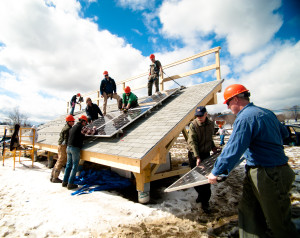 Vermont Technical College is committed to educating students as the workforce to support renewable energy systems and infrastructure development in Vermont. A number of technical “green trainings” are being offered in the coming months ranging from solar PV, solar hot water, waste water, OSHA standards, and wetland delineation.
Vermont Technical College is committed to educating students as the workforce to support renewable energy systems and infrastructure development in Vermont. A number of technical “green trainings” are being offered in the coming months ranging from solar PV, solar hot water, waste water, OSHA standards, and wetland delineation.
Vermont Tech is offering introductory and advanced classes that serve as a great opportunity for individuals to enter the growing field of solar installation and for the existing workforce to advance their skill set. By successfully passing the NABCEP Entry Level exam, students at an introductory level will demonstrate the basic knowledge necessary to apply the fundamental application principles, design installation, and operation of grid-tied and stand-alone PV Systems. Renewable Energy Vermont (REV) recently approved this 40-hour training to qualify any individual for Provisional Partnership, regardless of their status of an electrical license.
For the more advanced PV installer, an upcoming one day course on April 15th will provide continuing education for the Electrical S license in solar technology. Taught by Dan Kiney, in compliance with the Vermont State Electrical Board, this class has been approved by the VT State Electrical Board for 8 S License Continuing Education Hours.
The 16 hour Introduction to Solar Hot Water being held May 2-3 has been approved for licensed plumbers by REV for Provisional Solar Hot Water Partnership and only requires a basic knowledge of electrical systems.
Additionally, a BPI Dual Certificate Training scheduled for June 1-5 will focus on the building sciences related to physics and control strategies for air, heat, and moisture and will prepare students to test for their Building Analyst and Envelope Professional Certifications.
Learn more about these and other Vermont Tech Continuing Education & Workforce Development Green Trainings.
10 Mar 2014
Montpelier Announces a Renewable Energy Future

A new initiative is focused on making Montpelier, Vermont the first net-zero capital city in the country.
City officials today joined with energy leaders to launch a major initiative focused on making Montpelier the first net zero capital city in the country. Achieving net zero means that Montpelier would meet all its power needs through renewable energy sources and efficiency by 2030. The City of Montpelier was joined by a coalition of organizations that are committed to making this goal a reality.
“This ambitious goal, endorsed by the city council, sets a new direction for Montpelier’s energy future that will provide the opportunity for every citizen to engage,” said Montpelier Mayor John Hollar.
Montpelier is uniquely positioned to move forward on the net zero by 2030 goal. More than 15% of Montpelier housing units have already completed comprehensive energy efficiency projects with Efficiency Vermont; in 2013, the city upgraded all streetlights to high efficiency LEDs; and the downtown biomass district heating project is currently nearing completion.
The Energy Action Network and Montpelier Energy Advisory Committee have worked closely with the city to set the net zero goal and bring together the group of stakeholders to map out a plan of action. “Montpelier’s commitment to creating a secure and affordable energy future is tremendously exciting,” said Andrea Colnes, executive director of the Energy Action Network. “Through this project Montpelier and Vermont will again lead by example and inspire other cities across the US to reach for a bright future and shift to clean, renewable energy.”
Dan Jones, Chair of the Montpelier Energy Advisory Committee, describes this project as “a unique approach for a city as a whole. By engaging the city government, businesses, and citizens around a common vision, we hope to change the conversation from piecemeal small reforms to a system-wide reimagining of our energy priorities. This project will require the collaboration of all Montpelier’s sectors to make it a reality.”
As part of today’s launch, Green Mountain Power and Efficiency Vermont announced a suite of initiatives designed to support the effort by driving down energy consumption and increasing the use of renewable energy in Montpelier. These include:
Green Mountain Power will work with the city to locate multiple electric vehicle charging stations in the City;
- Efficiency Vermont will convene a “Net Zero Montpelier” community conversation in September to help residents, businesses, and local partners set goals and take action on energy efficiency. Reducing energy consumption is a key first step towards net zero, since it enables a larger portion of energy needs to be met through renewable sources;
- Efficiency Vermont experts will offer guidance, incentives, and support to help homeowners reduce their energy usage and make their homes “net zero ready;”
- Green Mountain Power will extend to Montpelier its pilot heat pump program that saves customers money while reducing fossil fuel use for heating;
- Efficiency Vermont and the City of Montpelier will develop an energy road map for all municipal facilities, including exploring the opportunity to design the new downtown transit center to net zero standards, and kicking off a large scale energy saving project at the wastewater treatment facility;
- The Vermont Department of Buildings and General Services will collaborate with Efficiency Vermont on a large scale effort to reduce energy usage in Montpelier’s state buildings;
- GMP will work with AllEarth Renewables to install solar trackers in a group net metering project involving the Vermont Natural Resources Council and Vermont Land Trust, who have expressed interest in taking the power. The trackers will be on GMP property near the entrance of the city and will be a visual statement of Montpelier’s commitment to becoming net zero.
“This initiative signals a transformation in how Vermont’s cities and towns will use energy,” said Mary Powell, president and chief executive officer of Green Mountain Power. “Deploying new technologies in our cities and towns, as we are also doing in Rutland, will have economic and environmental benefits for all Vermonters. It makes perfect sense that Vermont would be the state where we can successfully make our capital net zero.”
“We are looking forward to helping turn the vision of Net Zero Montpelier into a reality,” said Jim Merriam, Director of Efficiency Vermont. “In driving progress toward the net zero goal, Efficiency Vermont experts will engage with partners and community members at every level to help them get the most value for their energy dollars, and set the stage for a clean energy future.”
Other partners in Net Zero Montpelier have so far included: Vermont State Employees Credit Union, National Life, Vermont Energy Investment Corporation, SunCommon, IBM and the general membership of the Energy Action Network. As Net Zero Montpelier continues to engage the community, there will be numerous opportunities for additional organizations and stakeholders become actively involved in the effort.
For more information on Net Zero Montpelier, or to get involved, please visit www.eanvt.org/net-zero-montpelier. To learn more about GMP’s heat pump pilot project, email heatpump@greenmountainpower.com.
Press Contact:
Jessie Baker
Assistant City Manager
City of Montpelier
39 Main Street
Montpelier, VT 05602
(802) 262-6250




